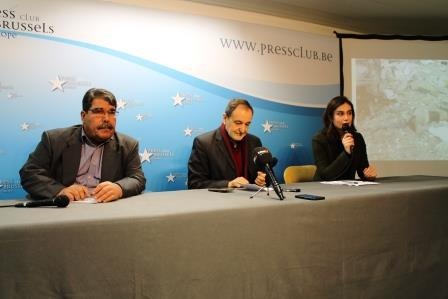The on-going war in Kurdish-held enclave Afrin in Northern Syria was discussed at a briefing in Brussels last week, organized by the Kurdish Institute. The war started on 20 January with unprovoked Turkish air strikes and is claiming a rising death toll among civilians and displaced persons who found shelter in the enclave. At the press briefing (14 February), Salih Muslim, former Co-Chair of the PYD (Democratic Union Party) and Riyad Derar, Co-President of the Democratic Syrian Council, described the military and humanitarian situation in Afrin.
Militarily the situation seems static with Turkey occupying a number of villages along the border while continuing its air strikes against targets in Afrin, including civilian targets and a 3000 year old Hittite archeological site (Ain Dara).
Claims about the use of forbidden weapons have not been independently verified. According to the speakers, ex-fighters from the Islamic State and other extremist groups are taking part on the Turkish side.
A list of casualties with precise names and dates, by age and gender, was presented at the briefing. Until 10 February, 154 people have been killed, among them many women and children, and about 400 injured.
The speakers claimed that no humanitarian aid is reaching Afrin from aid organisations based in Turkey. A spokesperson for the European Commission told the Brussels Times that it could not confirm the figures on displaced persons in Afrin but admits that aid convoys have been prevented from delivering assistance to those in need in Syria.
According to the United Nations, around 125 000 displaced persons from other parts of Syria have found shelter in Afrin – and many more in other Kurdish-held territories - and are affected by the war. Reportedly 15 000 people have been internally displaced in the Afrin enclave because of the air strikes.
Asked by the Brussels Times about their expectations from EU, the speakers replied: “We are part of a solution for a future democratic and decentralized Syria and want to be treated by the same standards on human rights as EU applies in other conflict situations.”
Next opportunity for EU to prove its commitment to an inclusive political solution in Syria will appear already this week in Brussels when its foreign policy chief Federica Mogherini is expected to meet the Syrian opposition (to the Assad regime) and other regional players.
EU’s position
EU’s foreign policy chief Federica Mogherini confirmed at a press conference last Friday (16 February), following an informal meeting of EU foreign ministers, that the Turkish “operation” in Afrin had been discussed with the Turkish minister for European affairs.
While expressing EU’s concern about the civilian casualties and the humanitarian situation in Afrin, she recognized the “legitimate Turkish security concerns”.
Not being able to condemn the Turkish air strikes and demand the withdrawal of Turkish troops from Afrin, she urged “our Turkish friends to show constraint in their military actions.”
Indirectly she confirmed the reports from Afrin by stating that “we are seeing not only there but also in other parts of Syria in these weeks a deterioration and an escalation on the military level that definitely is not encouraging in the current circumstances.”
She stated that there are no alternatives to the UN-led peace process: “What we have delivered to the UN-led process is an opposition, a Syrian opposition, which is today more united than ever before.”
M.Apelblat
The Brussels Times

